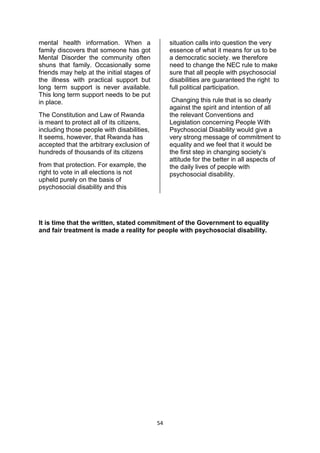This document summarizes a report by the National Organisation of Users and Survivors of Psychiatry in Rwanda (NOUSPR) on safeguarding the rights of people with psychosocial disabilities in Rwanda. NOUSPR conducted interviews with 200 people with psychosocial disabilities and 12 representatives from other organizations to understand their experiences. The report found high levels of stigma, lack of awareness, and discrimination that people with psychosocial disabilities face in accessing healthcare, education, employment and participating in community life. It recommends increased recognition of psychosocial disability and the rights of those living with mental health conditions based on the social model of disability in Rwanda's laws and policies.





















































